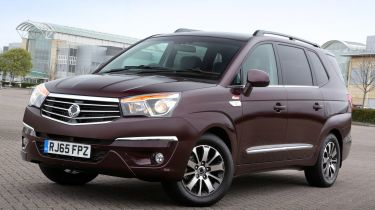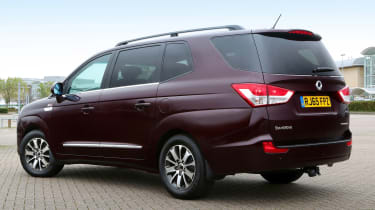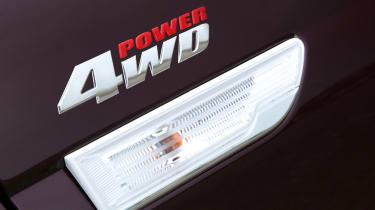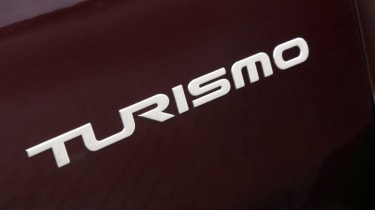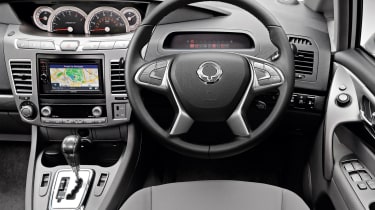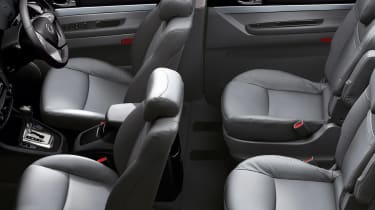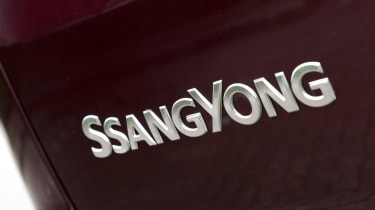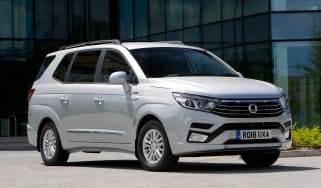SsangYong Turismo review
SsangYong's large MPV offers massive space for not a lot of cash, but it's far from perfect

SsangYong launched the Turismo in 2013 to replace the much-maligned Rodius. It’s still the same car underneath, but the Korean firm updated it inside and out - so much so that the manufacturer decided it required a new name.
The SsangYong Turismo’s styling has definitely been improved compared to the Rodius, but its still not exactly what you’d call pretty. It was always going to be difficult for SsangYong to disguise the reality that the car is well over five metres long, very upright and can carry as much as many large van-based people carriers.
You get seven, full-sized adult seats as standard in the Turismo, with three passengers sitting in the rear and two sat in the middle seats - some other markets get an eight-seat option too. The boot is vast - it's big enough for most needs with the rearmost seats folded, but take them all out and you get a massive 3,146 litres.
There’s only one engine available with the Turismo in the UK. It’s a 2.2-litre diesel engine that was introduced in 2015. Sourced from Mercedes, it produces 176bhp, which is only just adequate considering the weight it has to carry in a fully-Laden Turismo. Fortunately, the engine has plenty of low down grunt which means the Turismo is less out of its depth on inclines than you might expect. The Turismo is also available with four-wheel drive, which makes it an excellent tow car.
Used - available now

2023 Audi
A3 Sportback
19,678 milesManualPetrol1.0L
Cash £17,324
2024 Audi
A3 Sportback
30,795 milesManualPetrol1.5L
Cash £19,750
2024 Audi
A3 Sportback
17,333 milesManualPetrol1.0L
Cash £18,811
2021 Mercedes
A-Class
41,806 milesAutomaticDiesel1.5L
Cash £16,051There’s three trim levels on offer: SE, EX and range-topping ELX. Base models come with electric windows all-round, climate control, Bluetooth and electric heated mirrors. EX adds kit like leather, privacy glass and alloys, while the auto and four-wheel drive ELX comes fully loaded. Sat-nav is a £1,000 option on all Turismos, however.
SsangYong’s Turismo is a better car than the Rodius it replaced, but like the Rodius it offers great value. There’s nothing else in the price range that will carry this many passengers or this much luggage, while there’s plenty of equipment thrown-in too.
The 2015 updates to the Turismo result in a more efficient and refined car, but its still quite a long way off more mainstream MPVs in terms of the driving experience. Cabin quality isn’t great either, with some unpleasant trim and patchy build quality, while the sheer weight of the Turismo means it’s quite thirsty. Factor in the ungainly looks, and you start to see why SsangYong’s offering remains a niche choice in the UK.
Engines, performance and drive
Take one look at the Turismo and you won’t be expecting a thrilling drive. And you’d be right not to. Although it’s been heavily updated the big MPV still sits on the platform of the old Rodius, and that shows on the road.
The Turismo’s suspension is soft which means a comfortable motorway ride, but the body isn’t very stiff so the Turismo shimmies and crashes over large potholes around town. It’s no worse than some van-based people carriers, but the unsettled ride means it can’t compete with class-leading large MPVs.
Drive the Turismo quickly through corners and the high centre of gravity means it wallows and rolls about, while the vague, cumbersome steering doesn’t give any feedback. Thankfully, that’s not what this car is about, and driven sensibly its acceptable enough for most buyers. Only the intrusive wind noise harms cruising refinement, as road noise isn’t all that bad.
We’d recommend an automatic model as it suits the Turismo’s gentle character better. It now uses a Mercedes-sourced seven-speed ‘box which changes gear smoothly and quickly enough.
Engines
The only choice of engine with the Turismo is a new Euro6 2.2-litre unit replacing the old 2.0-litre. Power is boosted from 150bhp in the old engine to 176bhp, a useful jump. It also gets 40Nm more torque, at 360Nm. It all sounds healthy enough, but remember the Turismo weighs 2.1 tonnes.
Around town and cruising along the motorway, the Turismo feels quite sprightly given its size and weight. A top speed of 108mph isn’t going to set the world alight, but it’s more than sufficient for UK roads. Overtaking needs to be planned well in advance, however, as it feels more sluggish the faster you try to go.
The new engine’s refinement is better than that of the gruff old one too. It’s still a way off the smoothness of a Ford Galaxy’s diesel, but it’s a step in the right direction. Only under load does it really make itself heard, so the Turismo is less agricultural in character than big SsangYongs of old.
MPG, CO2 and Running Costs
The SsangYong Turismo is a big, heavy car, meaning only so much is possible in terms of efficiency. Having said that, the new diesel engine does manage to improve its official figures over the old engine despite offering more power.
Fuel economy is up across the range, with the most efficient rear-wheel drive manual model managing 39.2mpg. Add the seven-speed automatic gearbox, and that drops to 37.7mpg. Opt for four-wheel drive and it drops again to 36.2mpg, but even that’s not a bad figure given the capacity the Turismo brings. Expect just over 30mpg in the real-world.
The SsangYong Turismo is better, then, but its economy is still not a match for conventional MPVs. The fastest Ford Galaxy diesel manages 56.5mpg, while the larger new Citroen Spacetourer passenger van isn’t far off that figure.
Insurance Groups
The Turismo’s insurance figures are quite high given the class of car. The basic models are all the way up in group 34, while top spec 4x4 models are in group 36.
Depreciation
The Turismo might be cheap to buy, but it doesn’t hold its value well. After three years and 60,000 miles, the MPV is predicted to hold on to between 27 and 31 per cent of its value. People carriers aren’t all that desirable, but that’s way behind the likes of the VW Sharan (around 38 per cent) and the Ford Galaxy (around 40 per cent).
Interior, design and technology
With the famously ungainly Rodius as a base car, the SsangYong Turismo didn’t have a good start in life in terms of design. Still, the updates to the front and rear profile at least mean it looks more conventional and less like it’s been in a bad accident.
There’s no getting around the fact that the Turismo is a very large car, and it certainly looks it. The overhangs are massive, although visibility from the driver’s seat isn’t too bad thanks to the large expanse of glass and the centrally-mounted speedo.
As you’d expect from SsangYong’s budget-oriented range and low price, the Turismo isn’t exactly luxurious inside. Even base models get more equipment than you would imagine, but most plastic surfaces on the doors and dash feel cheap, and there are some extremely flaky bits of trim on the centre console. It also doesn’t look very modern, despite SsangYong’s best efforts with silver painted plastic and glossy trim inserts. The gear display on auto models also looks like it was taken from a 1980s microwave. It matters less on the great value base models, but range-topping examples are nearly £25k and the Turismo doesn’t wear that pricetag well inside.
Still, the Turismo is more about function than form, and most features are easy to use. The controls are simple and there’s only one (optional) central screen for those tired of being distracted by digital displays.
Satnav, stereo and infotainment
All Turismos come as standard with a CD/Radio that features USB and Bluetooth connectivity, wheel-mounted audio controls and six speakers. Sound quality is best described as adequate rather than exceptional, but at least the buttons are big and easy to use.
The optional sat-nav is an aftermarket Kenwood touchscreen system, which is a shame given the smaller, cheaper Tivoli crossover offers SsangYong’s own bespoke setup. The audio menus are a bit fiddly, but the navigation software is from Garmin and is easy to operate, plus it also adds DAB radio.
Practicality, comfort and boot space
It’s hardly surprising given the Turismo’s enormous exterior size, but nothing else this side of a van can compete with it in terms of space. It almost seems a shame SsangYong only offers it as a seven-seater here, as there could easily be room for eight.
The seating layout is a two-two-three arrangement, which is different from most people carriers that offer three seats in the middle. The bonus is that the front four seats are like captain’s chairs with masses of room, and the middle two can slide easily back and forth on rails.
Access to the back row is decent (but would be better with sliding doors) and even adults will find plenty of head and legroom. The seats are fiddly and heavy to fold and remove, however, and none of them fold flat into the floor, unlike in more conventional MPVs. The rearmost bench is also massive, but doesn’t split fold and would require two people to remove. Still, even with all the seats up, there’s plenty of luggage space.
Size
The Turismo is 5,130mm long, 1,915mm wide and 1,850mm tall, with a three-metre wheelbase. It also weighs 2.1 tonnes. That makes it exceptionally large even by MPV standards, and the benefits (and drawbacks) are clear. It’s difficult to manoeuvre about town and when parking, despite standard fit parking sensors, and the length means that it will hang over the edges of most UK parking spaces.
Boot
The Turismo’s boot is simply massive. With all seats lifted out it’s an impressive 3,146 litres, but even with all three rows up there’s still 875-litres up to the roof, which is 575-litres bigger than a Ford Galaxy. It’s not a very clever space, with little in the way of underfloor storage but you’d have a hard time filling it all up. The seat backs of the third tow of seats tip when you’re not using them, but they don’t fold into the floor and need to be removed completely if you want more space.
Headroom, legroom and passenger space
Every row of chairs is well catered for in terms of outright space. Even the biggest adult will sit comfortably in the front and middle seats, while there are plenty of storage spaces dotted about the cabin and a number of cupholders.
A lack of sliding doors means that van-based people carriers offer better access to the rearmost seats, but once you’re back there, even a six-footer can just about sit comfortably. There’s room for three slender adults across the rear bench.
Reliability and Safety
Every Turismo gets front and side airbags as standard, plus ESP, Active Rollover Protection, speed sensing door locks and an alarm. The middle row of seats offers ISOFIX mounts, but not the rearmost row, which is a shame as that’s something that a number of modern people carriers offer.
One thing that hasn’t been proven yet is crash test safety. Euro NCAP has yet to subject the MPV to its increasingly thorough testing regime, and despite decent equipment levels there’s no guarantee that the bodyshell is a strong as other MPVs. Still, it’s likely to be better than older people carriers.
It’s difficult to make statements about the Turismo’s reliability, either, given so little have been sold here. It’s also never appeared in our Driver Power survey. SsangYong is known to make tough products, however, and despite the cheapness of some interior plastics, the Turismo seems like a durable car underneath, especially with that Mercedes-sourced engine.
Warranty
Like every SsangYong, the Turismo gets an extremely competitive five-year/unlimited mileage warranty. That makes it an ideal choice for minicab drivers, but also means owners get plenty of peace of mind. By comparison, cars like the Ford Galaxy and SEAT Alhambra get a three-year/60,000 mile guarantee.
Servicing
There are only a handful of SsangYong dealers in the country, but the brand will let you get your car serviced at various ‘Authorised Repairers’. Service intervals are fairly regular, with the 2.2 diesel Turismo needing attention every 12 months or 12,500 miles. Servicing costs should be reasonable, too.
